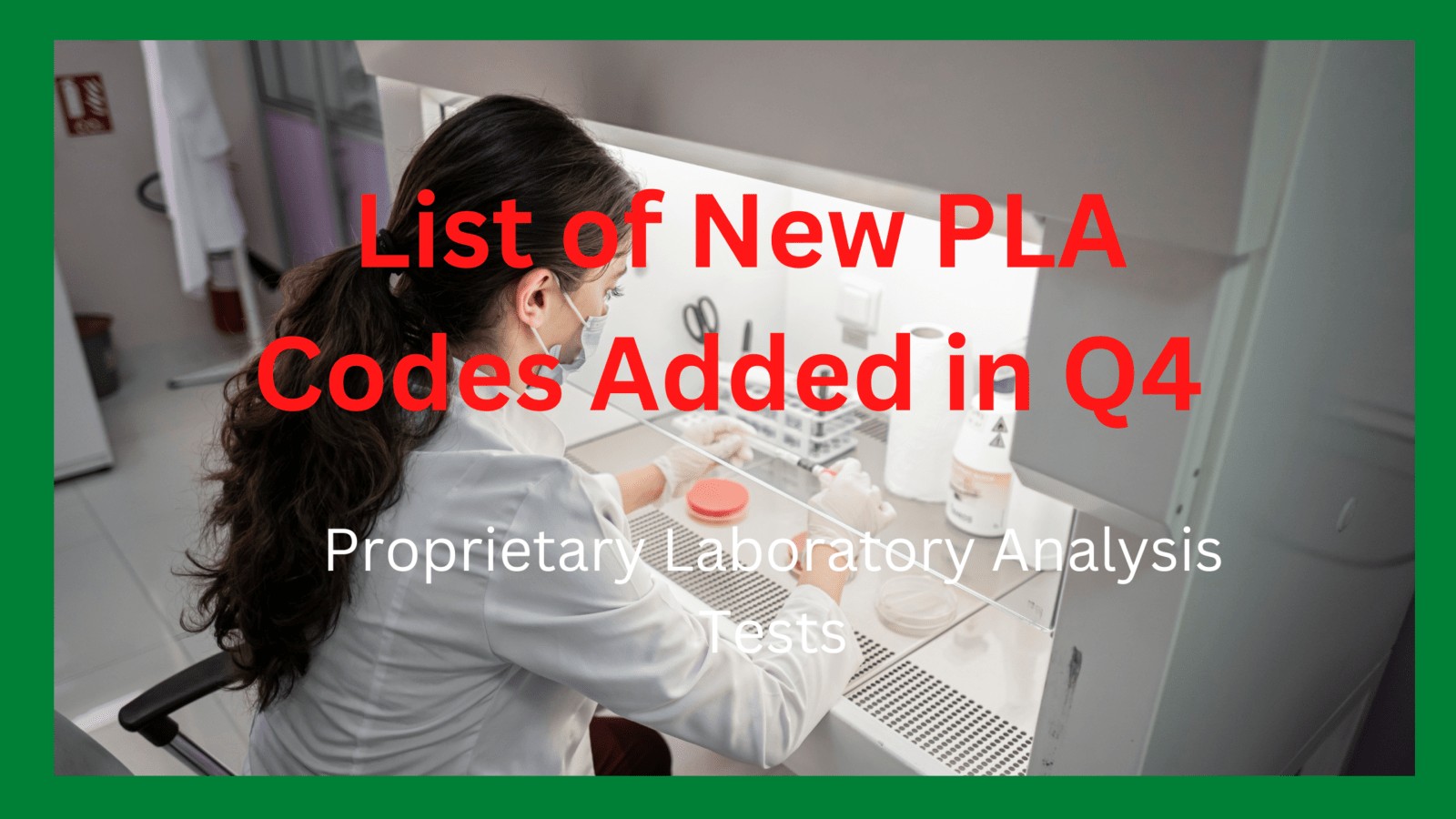CMS – The Centers for Medicare & Medicaid Services (CMS) issued a quarterly update to the CLFS- Clinical Laboratory Fee Schedule in August. 11 2022. This update includes 23 new Procedure codes (CPT) for PLA- Proprietary Laboratory Analysis Tests. All these code changes that are effective 1 October 2022.
The new types of service 5 codes that have been approved by the CPT® Editorial Panel are:
| CPT Codes | Description |
| 0332U | Oncology (pan-tumor), genetic profiling of 8 DNA-regulatory (epigenetic) markers by quantitative polymerase chain reaction (qPCR), whole blood, reported as a high or low probability of responding to immune checkpoint–inhibitor therapy |
| 0333U | Oncology (liver), surveillance for hepatocellular carcinoma (HCC) in high-risk patients, analysis of methylation patterns on circulating cell-free DNA (cfDNA) plus measurement of serum of AFP/AFP-L3 and oncoprotein des-gamma-carboxy-prothrombin (DCP), algorithm reported as normal or abnormal result |
| 0334U | Oncology (solid organ), targeted genomic sequence analysis, formalin-fixed paraffin-embedded (FFPE) tumor tissue, DNA analysis, 84 or more genes, interrogation for sequence variants, gene copy number amplifications, gene rearrangements, microsatellite instability and tumor mutational burden |
| 0335U | Rare diseases (constitutional/heritable disorders), whole genome sequence analysis, including small sequence changes, copy number variants, deletions, duplications, mobile element insertions, uniparental disomy (UPD), inversions, aneuploidy, mitochondrial genome sequence analysis with heteroplasmy and large deletions, short tandem repeat (STR) gene expansions, fetal sample, identification and categorization of genetic variants (Do not report 0335U in conjunction with 81425, 0212U) |
| 0336U | Rare diseases (constitutional/heritable disorders), whole genome sequence analysis, including small sequence changes, copy number variants, deletions, duplications, mobile element insertions, uniparental disomy (UPD), inversions, aneuploidy, mitochondrial genome sequence analysis with heteroplasmy and large deletions, short tandem repeat (STR) gene expansions, blood or saliva, identification and categorization of genetic variants, each comparator genome (eg, parent) u(Do not report 0336U in conjunction with 81426, 0213U)t |
| 0337U | Oncology (plasma cell disorders and myeloma), circulating plasma cell immunologic selection, identification, morphological characterization, and enumeration of plasma cells based on differential CD138, CD38, CD19, and CD45 protein biomarker expression, peripheral blood |
| 0338U | Oncology (solid tumor), circulating tumor cell selection, identification, morphological characterization, detection and enumeration based on differential EpCAM, cytokeratins 8, 18, and 19, and CD45 protein biomarkers, and quantification of HER2 protein biomarker–expressing cells, peripheral blood |
| 0339U | Oncology (prostate), mRNA expression profiling of HOXC6 and DLX1, reverse transcription polymerase chain reaction (RT-PCR), first-void urine following digital rectal examination, algorithm reported as probability of high-grade cancer |
| 0340U | Oncology (pan-cancer), analysis of minimal residual disease (MRD) from plasma, with assays personalized to each patient based on prior next-generation sequencing of the patient’s tumor and germline DNA, reported as absence or presence of MRD, with disease-burden correlation, if appropriate |
| 0341U | Fetal aneuploidy DNA sequencing comparative analysis, fetal DNA from products of conception, reported as normal (euploidy), monosomy, trisomy, or partial deletion/duplication, mosaicism, and segmental aneuploid |
| 0342U | Oncology (pancreatic cancer), multiplex immunoassay of C5, C4, cystatin C, factor B, osteoprotegerin (OPG), gelsolin, IGFBP3, CA125 and multiplex electrochemiluminescent immunoassay (ECLIA) for CA19-9, serum, diagnostic algorithm reported qualitatively as positive, negative, or borderline |
| 0343U | Oncology (prostate), exosome-based analysis of 442 small noncoding RNAs (sncRNAs) by quantitative reverse transcription polymerase chain reaction (RT-qPCR), urine, reported as molecular evidence of no-, low-, intermediate- or high-risk of prostate cancer |
| 0344U | Hepatology (nonalcoholic fatty liver disease [NAFLD]), semiquantitative evaluation of 28 lipid markers by liquid chromatography with tandem mass spectrometry (LC-MS/MS), serum, reported as at-risk for nonalcoholic steatohepatitis (NASH) or not NASH |
| 0345U | Psychiatry (eg, depression, anxiety, attention deficit hyperactivity disorder [ADHD]), genomic analysis panel, variant analysis of 15 genes, including deletion/duplication analysis of CYP2D6 |
| 0346U | Beta amyloid, Aβ40 and Aβ42 by liquid chromatography with tandem mass spectrometry (LC-MS/MS), ratio, plasma |
| 0347U | Drug metabolism or processing (multiple conditions), whole blood or buccal specimen, DNA analysis, 16 gene report, with variant analysis and reported phenotypes |
| 0348U | Drug metabolism or processing (multiple conditions), whole blood or buccal specimen, DNA analysis, 25 gene report, with variant analysis and reported phenotypes |
| 0349U | Drug metabolism or processing (multiple conditions), whole blood or buccal specimen, DNA analysis, 27 gene report, with variant analysis, including reported phenotypes and impacted gene-drug interactions |
| 0350U | Drug metabolism or processing (multiple conditions), whole blood or buccal specimen, DNA analysis, 27 gene report, with variant analysis and reported phenotypes |
| 0351U | Infectious disease (bacterial or viral), biochemical assays, tumor necrosis factor-related apoptosis-inducing ligand (TRAIL), interferon gamma-induced protein-10 (IP10), and C-reactive protein, serum, algorithm reported as likelihood of bacterial infection |
| 0352U | Infectious disease (bacterial vaginosis and vaginitis), multiplex amplified probe technique, for detection of bacterial vaginosis–associated bacteria (BVAB-2, Atopobium vaginae, and Megasphera type 1), algorithm reported as detected or not detected and separate detection of Candida species (C. albicans, C. tropicalis, C. parapsilosis, C. dubliniensis), Candida glabrata/Candida krusei, and trichomonas vaginalis, vaginal-fluid specimen, each result reported as detected or not detected |
| 0353U | Infectious agent detection by nucleic acid (DNA), Chlamydia trachomatis and Neisseria gonorrhoeae, multiplex amplified probe technique, urine, vaginal, pharyngeal, or rectal, each pathogen reported as detected or not detected |
| 0354U | Human papilloma virus (HPV), high-risk types (ie, 16, 18, 31, 33, 45, 52 and 58) qualitative mRNA expression of E6/E7 by quantitative polymerase chain reaction (qPCR) |
Additionally, CPT code 87593 Infectious agent detection by nucleic acid (DNA or RNA); orthopoxvirus (example – monkeypox virus, cowpox virus, vaccinia virus), amplified probe technique, each effective from 26 July, 2022.
These codes will be contractor priced until they are nationally priced and the CLFS annual payment determination is applied.
There are 4 procedure codes deleted, effective from 30 Sept. 2022 . These procedure codes are
- 1-0012U,
- 0013U,
- 0014U, and
- 0056U.
The complete CY 2022 Q3 release of lab codes is available on the CMS website.
Data Reporting Period Delayed for PLA Codes
The CLFS data reporting requirement and application of the 15 percent phase-in reduction is not applicable in Calendar Years 2021 and 2022, in accordance with the Protecting Medicare and American Farmers from Sequester Cuts Act.
The next reporting period is Jan. 1, 2023 – March 31, 2023, on the original data collection period of Jan. 1, 2019 – June 30, 2019; and payment reductions won’t exceed 15 percent in calendar years 2023-2025, according to CMS.
Reference Document:
Related Articles:
ICD-10-CM Official Guidelines for Coding and Reporting FY-2023
“Medicare and You”| Medicare Update Handbook
List of CPT Codes in Medical Billing
Place of Service 81|POS 81 in Medical Billing
ICD 10 Code for Secondary Cardiomyopathy

